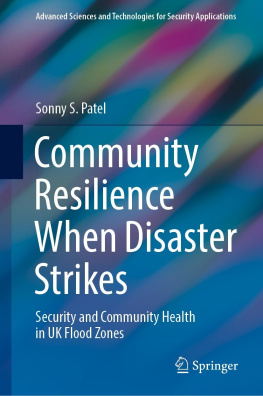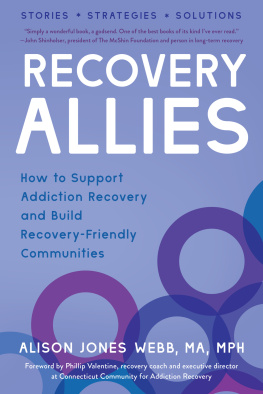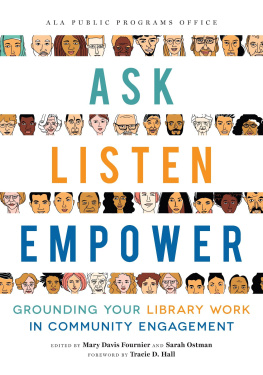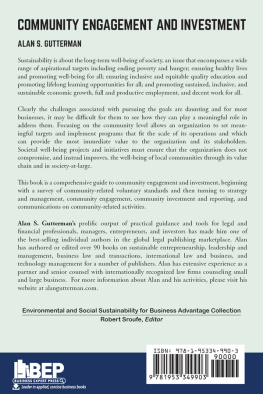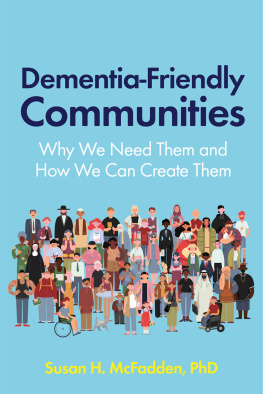
Community Engagement in Post-Disaster Recovery
Community Engagement in Post-Disaster Recovery reflects a wide array of practical experiences in working with disaster-affected communities internationally. It demonstrates that widely held assumptions about the benefits of community consultation and engagement in disaster recovery work need to be examined more critically because poorly conceived and hastily implemented community engagement strategies have sometimes exacerbated divisions within affected communities and/or resulted in ineffective use of aid funding. It is equally demonstrated that well-crafted, creative and thoughtful programming is possible.
The wide collection of case studies of practical experience from around the world is presented to help establish ways of working with communities experiencing great challenges. The book offers practical suggestions on how to give more substance to the rhetoric of community consultation and engagement in these areas of work. It suggests the need to work with a dynamic understanding of community formation that is particularly relevant when people experience unforeseen challenges and traumatic experiences. This title interrogates the concept of community through an extensive review of the literature and explores the ways of working with communities in transition and particularly in their recovery phases through an array of case studies in a range of socioeconomic and political contexts.
Focused on the concept of community in post-disaster recovery solutionsan aspect which has received little critical interrogation in the literaturethis book will be a valuable resource to students and scholars in disaster management as well as humanitarian agencies.
Graham Marsh is a Visiting Research Fellow in Disaster Management at the School of Energy, Construction and Environment, Faculty of Engineering, Environment and Computing at Coventry University, UK.
Iftekhar Ahmed is a Senior Lecturer in the School of Architecture and Built Environment, University of Newcastle, Australia.
Martin Mulligan is an Associate Professor in the Sustainability and Urban Planning section of the School of Global, Urban and Social Studies at RMIT University and a former Director of RMITs Globalism Research Centre, Australia.
Jenny Donovan is the Principal of Melbourne-based urban design practice Inclusive Design, Australia.
Steve Barton is a humanitarian training facilitator and freelance consultant working for agencies such as the Red Cross and the UN and is also founder and director of the Recovery Resource Centre.
Routledge Studies in Hazards, Disaster Risk and Climate Change
Series Editor: Ilan Kelman, Reader in Risk, Resilience and Global Health at the Institute for Risk and Disaster Reduction (IRDR) and the Institute for Global Health (IGH), University College London (UCL).
This series provides a forum for original and vibrant research. It offers contributions from each of these communities as well as innovative titles that examine the links between hazards, disasters and climate change, to bring these schools of thought closer together. This series promotes interdisciplinary scholarly work that is empirically and theoretically informed, with titles reflecting the wealth of research being undertaken in these diverse and exciting fields.
www.routledge.com/Routledge-Studies-in-Hazards-Disaster-Risk-and-ClimateChange/book-series/HDC
Published:
Climate Hazard Crises in Asian Societies and Environments
Edited by Troy Sternberg
The Institutionalisation of Disaster Risk Reduction
South Africa and Neoliberal Governmentality
Gideon van Riet
Understanding Climate Change through Gender Relations
Edited by Susan Buckingham and Virginie Le Masson
Climate Change and Urban Settlements
Mahendra Sethi
Community Engagement in Post-Disaster Recovery
Edited by Graham Marsh, Iftekhar Ahmed, Martin Mulligan, Jenny Donovan and Steve Barton
Community Engagement in Post-Disaster Recovery
Edited by Graham Marsh , Iftekhar Ahmed , Martin Mulligan , Jenny Donovan and Steve Barton
First published 2018
by Routledge
2 Park Square, Milton Park, Abingdon, Oxon OX14 4RN
and by Routledge
711 Third Avenue, New York, NY 10017
Routledge is an imprint of the Taylor & Francis Group, an informa business
2018 selection and editorial matter, Graham Marsh, Iftekhar Ahmed, Martin Mulligan, Jenny Donovan and Steve Barton; individual chapters, the contributors
The right of Graham Marsh, Iftekhar Ahmed, Martin Mulligan, Jenny Donovan and Steve Barton to be identified as the authors of the editorial material, and of the authors for their individual chapters, has been asserted in accordance with sections 77 and 78 of the Copyright, Designs and Patents Act 1988.
All rights reserved. No part of this book may be reprinted or reproduced or utilised in any form or by any electronic, mechanical, or other means, now known or hereafter invented, including photocopying and recording, or in any information storage or retrieval system, without permission in writing from the publishers.
Trademark notice : Product or corporate names may be trademarks or registered trademarks, and are used only for identification and explanation without intent to infringe.
British Library Cataloguing-in-Publication Data
A catalogue record for this book is available from the British Library
Library of Congress Cataloging-in-Publication Data
A catalog record for this book has been requested
ISBN: 978-1-138-69165-0 (hbk)
ISBN: 978-1-138-69167-4 (pbk)
ISBN: 978-1-315-53421-3 (ebk)
Typeset in Bembo
by Apex CoVantage, LLC
Contents
Professor John Twigg
Graham Marsh, Iftekhar Ahmed, Martin Mulligan, Jenny Donovan and Steve Barton
Martin Mulligan
Greg Ireton and Iftekhar Ahmed
Iftekhar Ahmed
Eva Bogdan, Amber Bennett and Lilia Yumagulova
Yung-Fang Chen
Mittul Vahanvati
David O'Brien, Catherine Elliott and Brendon McNiven
Lorenza Lazzati
Jenny Donovan
Beau B. Beza, Mary Johnson and Anne Shangrila Y. Fuentes
Marion E. MacLellan
Steve Barton
Martin Mulligan
Alex Greer and Sherri Brokopp Binder
Graham Marsh, Iftekhar Ahmed, Martin Mulligan, Jenny Donovan and Steve Barton
Iftekhar Ahmed is a Senior Lecturer in the School of Architecture and Built Environment, University of Newcastle, Australia. Previously he was a Lecturer and Research Fellow in the School of Architecture & Design, RMIT University, Melbourne. His work focuses on resilient and sustainable post-disaster housing systems, disaster risk reduction and climate change adaptation. He previously also taught and conducted research at the University of Melbourne and Monash University, Australia. In the past, he has worked as a project manager at the Asian Disaster Preparedness Center (ADPC), Thailand, and as a shelter specialist at the United Nations Development Programme (UNDP), Bangladesh, and taught at the Bangladesh University of Engineering and Technology. Dr Ahmed has also served widely as a consultant for several international development and humanitarian agencies, particularly those working in the disaster risk reduction field. He has written a number of books and professional reports and has many peer-reviewed publications to his credit.


